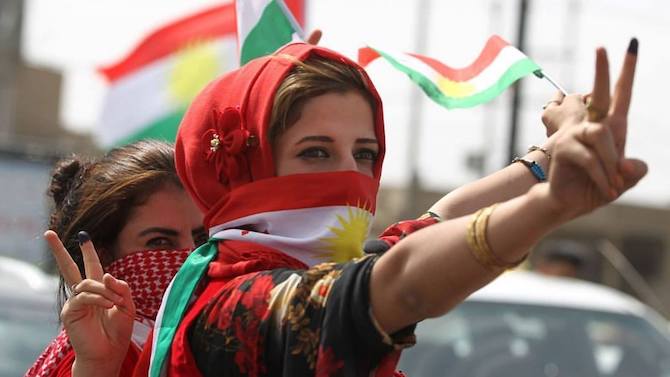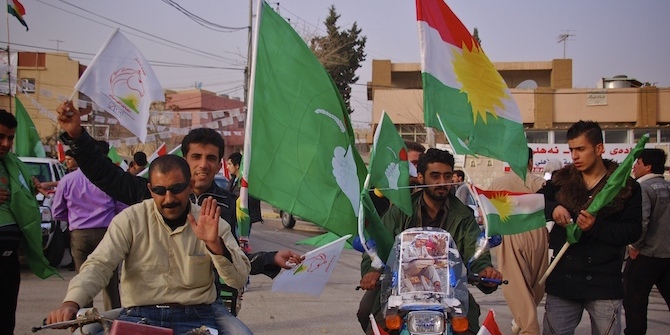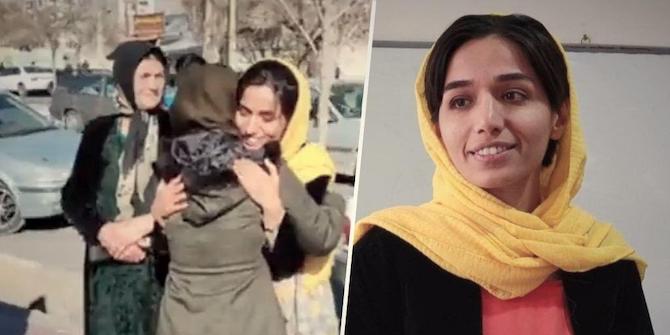by Omer Tekdemir

In the era of global right-wing populism, political elites use nationalism in different parts of the world. In Queen Elizabeth’s lifetime, 128 countries have already gained independence. The Kurds are the largest stateless nation in the world and the Kurdish question in the Middle East remains a puzzle for international relations. Self-determination is an ambition for the Kurds in Iraq. It is occurring in a different way compared with the late nation-states, particularly in the post-communist blocs, including the new countries of former Yugoslavia and in the post-colonial states in Arabia, Africa and Asia. Yet, in the Kurdish model, there is some resemblance to the case of the Catalonian referendum in Spain and the Scottish referendum in the UK.
The dream of an ‘independent Kurdistan’ is frozen after the involvement of many powers, despite that 78% of the eligible voters (approx. 5 million) turned out to vote on 25 September 2017 and 93.29% of Kurdish people said ‘Yes’ to a ‘free state’. Once again, the Kurds have ‘no friends but mountains’. Regional states like Turkey did not accept the declaration of independence, while the US has advised to cancelling the call for the referendum. The Iraqi army with the Iranian state-sponsored Shia militia group, the Popular Mobilisation Forces (Al-Hashd Al-Sha’abi), attacked and recaptured the oil-rich city of Kirkuk from the Kurds due to the lack of consensus between the Kurdistan Democratic Party (KDP) and the Patriotic Union of Kurdistan (YNK). The veteran Kurdish politician Jalal Talabani has said that “Kirkuk is the Jerusalem of the Kurds’.
The demand for territorial sovereignty is related to different regional and international actors. The hope of establishing an independent nation-state began with the decentralisation of Iraq after the Gulf Wars I-II (1991-2003) and the end of Saddam’s regime. The Kurdish Peshmerga’s successful operation in liberating Mosul from the so-called Islamic State (ISIS/DAESH) in July 2017 created serious security concerns for the Kurds particularly, when ISIS almost took over the capital, Erbil, in August 2014 and the Iraqi government could not provide protection. Baghdad failed in its promises to its Kurdish citizens and adherence to their constitutional rights. Besides, the commercial activities of the transnational companies (e.g., gas, oil), the geopolitics of the region, and the proxy war between international powers (e.g., the US and Russia) in Syria encouraged the President of Kurdistan Regional Government (KRG), Masoud Barzani to realise the long-awaited dream of independent since WWI.
The Era of Neo-nationalism
The KRG is being formed through a progressive nationalist approach that entails diversity among many different ethnic and religious minorities, such as Arabs, Turkmens, Assyrians, Yezidis, Jews and Christians. Such unorthodox nationalism promises a heterogenic ‘imagined community’ that champions the multi-lingual nation. The KRG has already started to use Kurdish, Arabic, Turkmen and English, for instance in the referendum ballot. This new political project would create a new Kurdistani community based on liberal multiculturalism and political pluralism. By redrawing the borders of the Sykes-Picot (1916) map, the Kurds in Iraq aim to integrate with the international market economy and become a member of the liberal democracy club. This model of the Kurdish state is dramatically different from its counterpart in northern Syria. In contrast, the autonomous canton regime of the Syrian Kurds is formed as a stateless democracy based on a communal economy, gender-equality and an anti nation-state structure.
After the referendum, a historian might claim that the Kurds have once again missed a golden opportunity, as they did in the modern past. For example, the Kurds experienced an independent Kurdistan with the Republic of Mahabad in Iran for eleven months in 1946, and with the self-proclaimed/unrecognised Republic of Ararat in Turkey (1927-31) and Red Kurdistan that existed as an autonomous province in the former USRR (1923-29). All were very short lived.
The Kurdish demands for democratic pluralism and multiculturalism could serve as a model for other Middle Eastern countries to democratise and secularise their authoritarian regimes. This political project promises to bring stability, compromise and prosperity to the region, but more importantly to become a security cordon for the countries of the region and the West by paralysing the rise of fundamental groups and perhaps even keeping local populations from migrating.
The Post-hegemonic Multinodal Middle East
This historical shift and Kurdish political trajectory could encourage Turkey and Iran to liberalise their political systems, thus meeting their ‘own’ Kurdish population’s discontent and collective demands. This does not mean that the Kurds in these countries will also follow the same path towards a separate state. Instead, it highlights that this Kurdish progressive politics can become a vigorous enabler to consolidate regional political, economic and social life. It could accelerate the Shia Arab government of Iraq towards a political reconciliation with the leaders of the majority Sunni Arabs and different tribes. This could be done in the central government along with acting against the possible support for radical political Islamic groups after the post-ISIS era.
It seems that the Kurdish dream of an independent nation-state is being postponed again. However, if the KRG is able to keep on its promise to embrace democratic, secular, egalitarian and libertarian values, then the KDP administration could create national unity and continue to play a role in the domestic and regional power struggle. In this way, it could find a place in world politics, as the international society can sympathise with the continual dream of independence. Likewise, for regional politics, this might also calm Turkey and Iran’s political anxiety as well as their tendency for military aggression and economic embargos towards their ancient neighbours. The soft relationship would also benefit the political economy of the region. It will provide the stability of domestic politics, and protect these states against their conceivable vulnerability in foreign affairs in potential disputes with global powers. Moreover, it can help to consolidate peace among the people of the region under the current zombie politics of post-truth and authoritarianism.







1 Comments